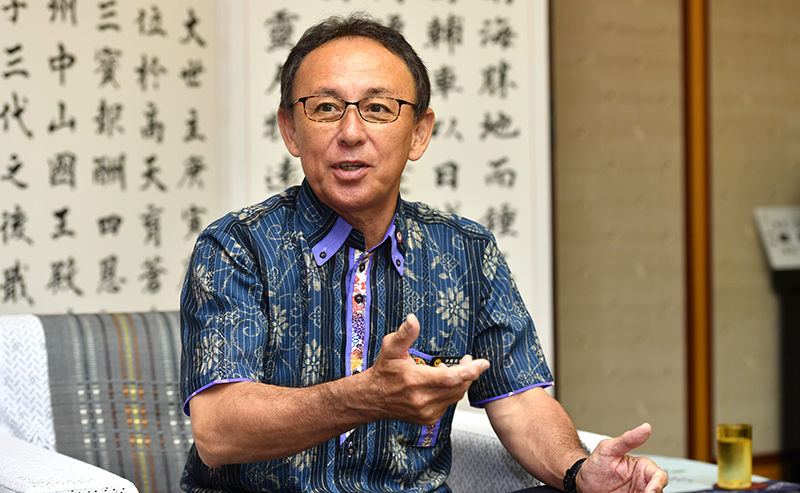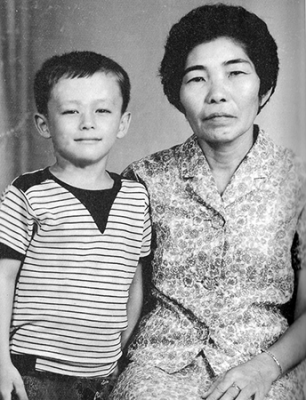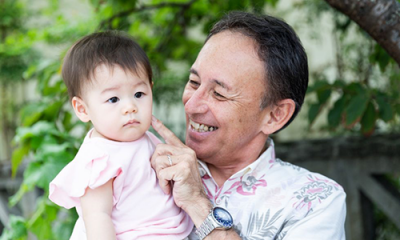Interview: Gov. Tamaki on cooperation and society’s role in personal fulfillment

Gov. Denny Tamaki
September 13, 2019 Ryukyu Shimpo
Interviewed by Tsuyoshi Matsumoto (Editor-in-Chief, The Ryukyu Shimpo)
Okinawa’s goal to create “a caring, uniquely Okinawan society, in which no one is left behind,” is also the core philosophy of the prefectural administration, as it advances its U.N. Sustainable Development Goals (SDGs). In August, the The Bankoku Shinryo (bridge between nations) Committee, commissioned by Gov. Denny Tamaki, launched the first of its SDGs discussions.
The Committee, comprising private-sector experts, debates critical issues faced by the prefectural administration.
“No one left behind” is a SDG as well as a slogan the governor adopted before he took office.
What was the inspiration behind his motto, and what drives Gov. Tamaki to make it a reality? We asked the man himself.
“Every finger is important.” His mother’s words embraced individuality.
The governor was born to an Ie-native mother, and an American father, who was a U.S. Marine. His father subsequently returned to the U.S., while his mother made the decision to stay in Okinawa.
She lived and worked in Henoko, Nago City, which has been an area of contention in recent years, over the Henoko military base construction.
Tamaki was raised by another family, in a warm uchinanchu (Okinawan) environment (which provides heart-to-heart connections between people who aren’t necessarily blood related.)
However, he was eventually bullied by older schoolmates, as his physical features stood out.
“I would come home crying, and my mother would say in Okinawan, ‘All ten fingers are different. They vary in shape and size, but each finger is important.
Their differences are what makes them great.’ I naturally learned from her words that individuality is expected.”
“During summer break, I would take the bus and boat to visit my mother’s hometown in Ie Island.
In Ie, even the young elementary school children help out on the fields and care for livestock all day.
The locals would say, ‘You must be so-and-so’s kid,’ and talk to me. There was a feeling, a culture, of everyone watching over the kids.
Times were tough, but there was an abundance of love for the children; we naturally shared what we had with one another, because we were poor. This was also the case in my hometown of Yonagusuku (current day Uruma City).”

A young Denny Tamaki posing with Katsu Chibana. Chibana raised Tamaki; he called her okkah (mother.) (Photograph provided by the governor.)
―What inspired the slogan, “no one left behind”?
“I think it came to me organically, from the environment in which I grew up. My mother and I moved to Koza City when I was ten years old. A town coexisting with a military base—I sensed a special mood.
The Koza riot of 1970 shocked me. I didn’t understand what was happening, and thought we might be at war.
As I grew older, I learned from my seniors that the path forward for post-war Okinawa is fighting for human rights and freedom; I learned from them the dignity of Okinawan democracy.
I began thinking that diversity and tolerance is vital, in order for everyone to live a contented life.”
“This idea was reinforced during my years as a radio personality. Even when I entered the world of politics, I found myself wanting to build a caring, uniquely Okinawan society, where no one is left behind.”
Independence, coexistence, diversity: uniquely Okinawan SDGs.
―SDGs can encompass Okinawa’s societal challenges. How did you connect the two?
“The prefecture amassed feedback from its residents, continually engaged in discussions, and put forward the ‘Okinawa 21st Century Vision’—the prefectural goals for the year 2030; it’s at the core of the prefectural administration. When we combine this vision with the SDGs philosophy and plans, you’ll find that it’s compatible with the times, and allows for each and every Okinawan to partake in the development of the prefecture.”
―The nation and the rest of the world are also advancing SDGs.
“SDGs and Society 5.0, which our nation aspires to be, are inseparable. Sustainable development is not all about economics, or all about security.
The global community’s debate on balancing development and security provides us with clues on what ‘uniquely Okinawan SDGs’ might look like.”
―How will you work together with the Okinawan people?
“We must protect human dignity while emphasizing independence, coexistence and diversity; Our point of reference should be a ‘coexistent society’ that offers diversity, inclusivity and tolerance.
Okinawans treasure the chimugukuru (Okinawan ethos) and yuimaru (spirit of cooperation)—We position ourselves between the uyafaji (the previous generation) and the warabincha (the future generation) in the circle of life to think ahead about the future of our society.
This shared value is a strength for Okinawans. Drawing on this strength and our Okinawan-ness, while deploying the ‘Okinawa 21st Century Vision,’ enables us to advance SDGs that are uniquely Okinawan.”
―You also believe dialogue is important.
“Partnership is key to achieving our SDGs. A society can persist only with cooperation. What we need is for the nation, the prefecture, our cities, villages and towns to continually engage in talks.
We can work together as we look to the trailblazing municipalities, and learn from the shortfalls of the prefectural government.
Each and every person is a stakeholder, and I want to ensure Okinawans are a part of the partnership.
Dialogue, cooperation and harmony are all essentially yuimaru.
It’s instilled in us Okinawans. I don’t think it’s a tall order.”
How each of us can contribute: providing clues to getting involved.
―What would you say to someone who is unsure of how to participate in achieving SDGs?
“I say to the kids—when we ask ourselves, ‘What can we do to take care of our oceans?’ and ‘How can we decontaminate the river waters that end up in the ocean?’ it helps us think of ways to be kind to Okinawa, and to the planet.
The objectives of the SDGs are set in areas of economics, society and environment.
At least one of these areas will relate back to our society, and to our lives.”
“Feeling safe and living without uncertainty, in other words, peace, ties back to all aspects of the SDGs. For example, when you realize your lifetime commitment to care for your [pet] dog or cat contributes to peace, that becomes a point of entry to participating in the effort.
If we provide people with these clues and keywords, and show what areas they can get involved in, it will help each person do more. I want to create these points of entry.”
“The ‘All for one, one for all’ mentality is vital in creating a society in which no one is left behind.
We want as many people as possible to view themselves as active participants. Involvement is personal development.”

Gov. Denny Tamaki with his granddaughter. (Photograph provided by the governor.)
―Tell us your vision for the future.
“I want it to be common place for children to grow up in a sound environment, and with dignity.
SDGs are a globally shared framework tool to realize our ideals. What’s important is that we stay focused on our goals, while solving some of the issues at hand.
By working together, we can build a society in which people enjoy the seemingly simple joy of working towards a dream—and that’s what provides personal fulfillment in our lives.”
(English translation by T&CT and Monica Shingaki)
Previous Article:Editorial: Second ruling decision for Kadena noise pollution
Next Article:30 meter landslide in Henoko near ammunition depot
[Similar Articles]
- Gov. Denny Tamaki on the “Okinawan Spirit”
- Gov. Tamaki shares his mother’s words and lesson learned from WWII: ‘Life is precious’
- In New Year’s address, Gov. Tamaki highlights policies to alleviate child poverty and improve employment
- Community roundtable for island-wide debate on SDGs and inclusivity
- Governor gives university lecture: “ You can change politics.”
 Webcam(Kokusai Street)
Webcam(Kokusai Street)


